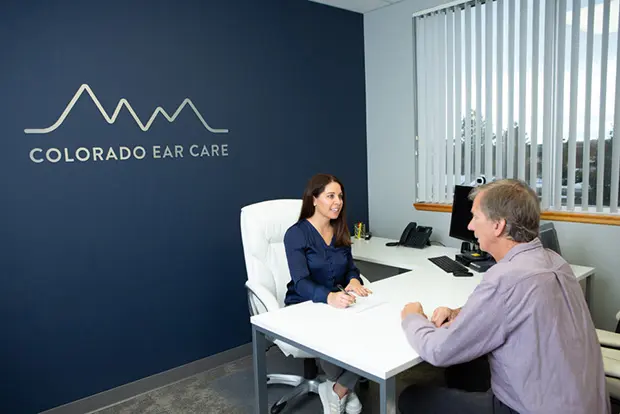The Colorado Ear Care team is here to educate you, help you understand the benefits of binaural hearing support, and educate you on your hearing wellness options so you can hear and live your best.
What is the benefit of wearing two hearing aids vs. one?
As hearing care providers with decades of experience in serving our community, one of the most common questions we’ve received from patients is in regard to the benefit of wearing two hearing aids vs. one.
In many instances, we can see via the results of a patient’s audiogram that a treatable hearing loss will be more severe in one of their ears vs. the other, leading the patient or their loved ones to reasonably assume that a hearing aid is only needed in the ear with the most severe degree of hearing loss.
However, this is not typically the case or necessarily the recommendation that we would make to our patients. Why? Our mission at Colorado Ear Care is to help everyone in our care to hear better, feel better, and live better lives, and supporting the way you hear naturally through the use of properly fit technology is just one of the means in which we help you do just that.
The first and perhaps most important step in your getting the best possible hearing care is to better understand intricacies of hearing and hearing wellness so that you can make informed, confident decisions about your health. That’s precisely why Colorado Ear Care exists — to provide comprehensive testing and service offerings beyond the average audiology clinic. But it all starts with your unique experience with your hearing, so let’s take a moment to explain a few things you might not know about hearing and hearing care.
What is binaural hearing?
To put it simply, binaural hearing means “to hear with two ears.” You see, we naturally hear in stereo, meaning that we not only hear sounds with both of our ears, but that this process of binaural hearing also helps us understand the direction where sounds are coming from, process the distance of sounds, and even better distinguish multiple sounds that we’re simultaneously hearing, especially those related to understanding speech in noisy environments.
Hearing your best with both ears means a stronger perception of the world around you, which can positively affect your safety and awareness of the world around you. Still, you might be wondering, what is the benefit of wearing two hearing aids if there is a more noticeable loss in one ear over the other? Can’t I just rely on my “good ear” in combination with a hearing device for my other ear? Well, sure. You could, but we don’t recommend it because it’s not what is best for your ears, your brain, or your long-term hearing health.
What is the benefit of wearing two hearing aids vs. one?
Hearing loss can occur for a variety of reasons, including prolonged exposure to noise, ototoxic medications, and, most commonly, the natural effects of aging. This is why we encourage all adults over the age of fifty to get an annual hearing exam. This is around the age where hearing loss will start to reveal itself, and if we’re working together to assess your hearing, we can identify and treat your hearing loss when it presents itself at the most appropriate time to intervene.
If your tests reveal a disparity in hearing loss from ear-to-ear, then one potential option is hearing aids. We often recommend wearing hearing aids for both ears because properly fit technology means that we can create a balance, so to speak, for the way in which your auditory system and brain are hearing and processing sounds.
Can’t I still just wear one hearing aid vs. two?
Well, it depends. Each hearing situation is unique, and in our experience, there are no one-size-fits-all solutions when it comes to your hearing health. Fitting technology to only one ear while your non-aided ear still presents a loss (or worse, forgoing technology altogether and just relying on your “better ear”) can cause your brain to work harder to compensate for its lack of hearing.
This overcompensation can cause fatigue. And this fatigue can lead to a whole host of other issues, including turning up the volume of the television or other devices too loud, or avoiding social situations altogether, which in turn can have a negative impact on your hearing and emotional well-being.
Are you seeing a pattern here? By not addressing what at the time seems like a small, short-term issue, we can ultimately cause bigger, long-term problems for our health.
How do I know that two hearing aids are appropriate for my type of hearing loss?
In our experience, it’s all about the care and recommendations offered to you. We often recommend and fit two hearing aids for our patients who have a treatable loss in both ears, but there isn’t necessarily a hard and fast rule on the subject. Your test results help guide the way in which we apply treatment. We started Colorado Ear Care because we noticed an influence on our profession that placed a greater emphasis on the retail sale than on patient care.
Our philosophy is centered on providing an elevated approach to care, one that focuses on testing, educating our patients about their condition and their options for treatment, and applying the recommendation that best suits their condition, budget, and hearing wellness goals. It’s not about our sales targets, it’s about your distinct needs, just as it should be.
Do you want to hear your very best, as naturally as possible?
We want you to, too! If it’s determined you need hearing aids, you’re eligible for a week-long, no-risk hearing aid demo. We call it, “Diagnose. Demo. Decide.”

